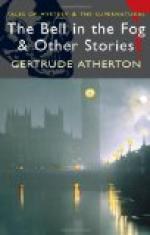“This sort of thing goes,” Chapman said, “although these people are just plain tourists. I label them ‘the beautiful Miss Brown,’ or ’the famous Miss Jones,’ and the average reader swallows it, to say nothing of the fact that it makes the paper look well. The swells won’t go in with the common herd, and want the ocean fenced in too, as it were. There are some of them over there in their carriages, taking a languid interest in the scene because they’ve nothing better to do. But they’d no more think of getting out and sitting on this balcony, as they do at Narragansett, than they’d ride in a street-car. Want to go up to the Casino and see the stage go off? That’s one of the sights.”
Andrew had spent a half-hour the evening before gazing at the graceful brown building which had long been a part of his dreams. He welcomed the prospect of seeing a phase of its brilliant life.
They reached the Casino a few minutes before the coach started. A large round-shouldered man, with face and frame of phlegmatic mould, occupied the seat and swung his whip with a bored and absent air. Two or three girls, clad in apotheosized organdie, and close hats, were already on top of the coach. An elderly beau was assiduously attending upon a young woman who was about to mount the ladder. She was a plain girl, with an air of refined health, and simply clad in white.
“She’s worth sixteen million dollars in her own right,” said Chapman, with a groan.
On the sidewalk, between the Casino and the coach, were two groups of girls. One group gazed up at their friends on the coach, wishing them good-fortune; the other gazed upon the first, eagerly and enviously. Andrew looked from one to the other. The girls who talked to those on the coach wore organdie frocks of simple but marvellous construction. Shading their young pellucid eyes, their bare polished brows, were large Leghorn hats covered with expensive feathers or flowers. Air, carriage, complexion, manner, each was a part of the unmistakable uniform of the New York girl of fashion. But the others? Andrew put the question to Chapman.
“Oh, they’re natives. We call them that to distinguish them from the cottagers. They get close whenever they get a chance, and copy the cottagers’ clothes and manners. But it doesn’t take a magnifying-glass to see the difference.”
Andrew looked with a pity he did not admit was fellow-feeling at the pretty girls with their bright complexions, their merely stylish clothes—which reminded him of Polly’s—the inferior feathers in their chip hats. The sharp contrast between the two groups of girls was almost painful.
“I’ve got to leave you,” said Chapman; “but I’ll see you later. Take care of yourself.”
The horn tooted, the whip cracked, the coach started. The men on the club balcony above the Casino watched it lazily. The street between the coach and the green wall opposite had been blocked with carriages that now rolled away.




